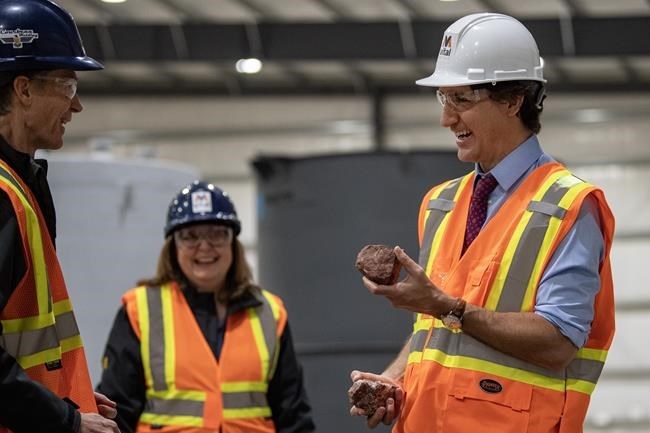SASKATOON — Justin Trudeau pressed Saskatchewan's government on its record for clean energy projects after Premier Scott Moe expressed disappointment he was not made aware of the prime minister's visit to a rare earth elements processing plant.
"There's work to be done on encouraging the government of Saskatchewan to see the opportunities that companies, and indeed, workers, are seeing in … cleaner jobs, in the opportunities for cleaner energy projects," Trudeau said Monday after a tour through the Vital Metals facility in Saskatoon.
"These are things we are going to continue to work on."
Moe called Trudeau's statement "disingenuous" and "uneducated" later Monday when he addressed reporters in Regina. However, the premier said his Saskatchewan Party government is still working on ways to repower its electrical sector to meet federal regulations.
"We are putting together our plan right now," he said.
Moe released a statement earlier in the day saying he hadn't been told about the prime minister's visit to Vital Metals. Moe said Saskatchewan is a global leader in critical minerals and rare earth elements.
"It's disappointing because this is an area that the provincial and federal governments see eye to eye on," Moe said in the statement.
Moe has often criticized the federal Liberal government's approach to environmental policies in the name of Saskatchewan’s resource sector.Â
Last year, Moe released a policy paper highlighting his government's plan to flex its autonomy and his government introduced a bill that would assert provincial jurisdiction over resources. The Saskatchewan First Act passed its second reading in November.
Saskatchewan Opposition NDP Leader Carla Beck said Moe's criticism of the prime minister's visit was a missed opportunity to showcase the province's potential in the industry. Â
"Everywhere I go, people tell me that they have grown tired of politicians — at all levels — stoking division to score political points instead of working together to achieve real results for the people they represent," Beck said in an statement.Â
Trudeau said there have been many opportunities to make announcements with Moe over the years. The prime minister said the Saskatchewan government remains an important partner on many different issues.
Both government leaders say Canada and Saskatchewan play an important role in responding to supply chain disruptions and shifting demand for reliable access to rare earth elements and critical minerals.
Moe said the Saskatoon facility is unlike any of its kind in the world. He said Trudeau's visit was a missed opportunity to have discussions about the facility and rare earth elements processing in Saskatchewan.
Lithium, graphite, nickel, cobalt, copper and the group of 17 metals and minerals known as rare earth elements are СŔ¶ĘÓƵ prioritized for investments in exploration, production and processing as part of Canada's critical minerals strategy.Â
They are used in solar panels, phones and computers, as well as electric vehicle batteries.
Once fully operational, the Saskatoon plant is to receive beneficiated ore from Canada's first operational rare earth mine, the Nechalacho mine in the Northwest Territories.
Trudeau said the rare earth elements and critical minerals markets have been dominated by China, which is "a somewhat challenging partner at the best of times." Russia, with the invasion of Ukraine, is no longer a reliable supplier of energy to Europe, he added.
"That's why the world is looking to Canada." Trudeau said.
Critical minerals were also among the issues Trudeau, U.S. President Joe Biden and Mexican President Andres Manuel Lopez Obrador discussed during their summit last week in Mexico.
Canada is not a commercial producer of rare earth elements, though it does have some of the largest-known deposits.
In 2020, the World Bank predicted that demand for critical minerals that are used in batteries and clean energy generation will soar 500 per cent by 2050.
This report by The Canadian Press was first published Jan. 16, 2023.
Kelly Geraldine Malone, The Canadian Press

